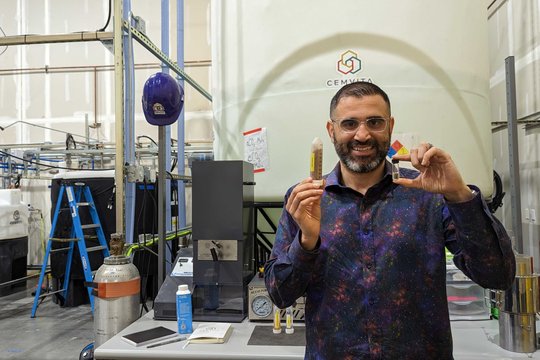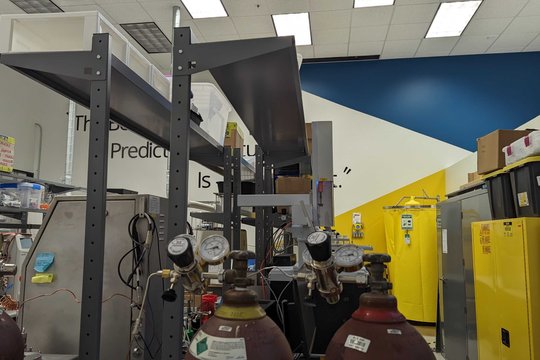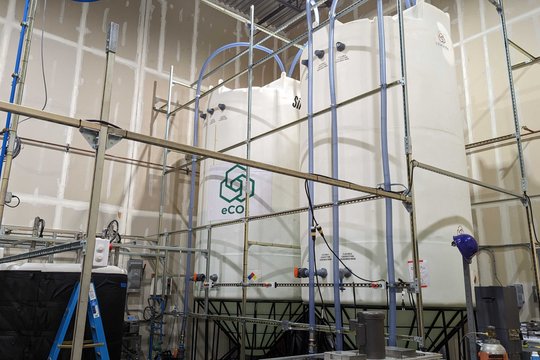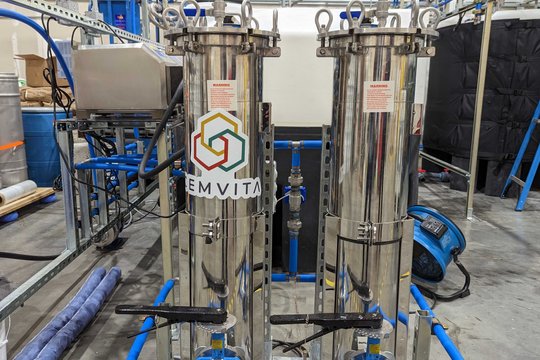The eCO2 Process Innovation Center, or EPIC, is the size of a small apartment and consists of large tanks and bubbling vats. It is also the latest milestone for one of Houston’s fastest-growing technology companies, Cemvita.
The 600-square-foot pilot plant opened in early April has a maximum volume of 55,000 liters and converts carbon dioxide into Cemvita’s eCO2 Oil, an alternative to soybean oil for the production of sustainable fuels. Cemvita CEO and co-founder Moji Karimi told the Houston Business Journal opening the plant was the first step to positioning the company as an eventual major player in the energy industry.
“Right now, you have companies that they call themselves oil and gas companies, mining companies,” Karimi said. “But the thing is, you're all natural resource companies. And I see room for a bigger company in this space that presents themselves that way.”
Cemvita’s microbe-based production methods, based off research performed by co-founder Tara Karimi, are intended to produce biofuels with less need for the space and resources required for farming and producing soybean oil. The organisms convert carbon dioxide feedstock into the fuel, and the stock can be sourced from captured carbon dioxide.
In addition to eCO2 Oil, the plant produces a solid biomass, which Moji Karimi compared to fertilizer in terms of potential application and can be sold as an additional product. Karimi said the goal of the plant was to create a self-sustaining, no-waste system.
“Everyone is talking about how they don’t have enough feedstock — they’re talking about what we produce here,” Karimi said.
According to Karimi, part of Cemvita’s revolution is the use of different types of microbes for applications outside of food or medicine. The EPIC plant is housed near Cemvita’s current headquarters off Kirby Drive, where the company develops a library of different microbes and tests them for use in fuel production or other applications. Karimi said some of the tests that need to take place involve a microbe’s longevity and what other byproducts it may produce, and some of the organisms can be tailored to make certain products.
Karimi said EPIC can be used as a baseline for future plant designs that can be reproduced and sold to be installed on existing energy campuses or pipelines, or even at a different source of carbon dioxide. According to Cemvita officials, the plant can capture carbon dioxide emissions either at a point-source level, such as flue gas from a refinery, or at a bulk-source level from a pipeline.
“As you think about five years, 10 years, 15-20 years, we want to be able to also use direct air capture [to feed the microbes],” Karimi said. “Then you can put this [plant] anywhere you want — you don't even need to be tied to any kind of infrastructure.”
The Karimis have been working on Cemvita’s technology for most of the past decade after exploring its application in the energy field. Moji, who previously worked in the oil and gas sector and had experience on drilling rigs, said part of the challenge pitching the technology was finding receptive audiences.
One of those audiences was Houston-based Occidental Petroleum Corp. (NYSE: OXY) and its CEO, Vicki Hollub. Early meetings with Hollub and Oxy led to a 2021 collaboration for an ethylene plant developed by Cemvita with aid from the energy giant’s investment arm, Oxy Clean Ventures.
Asked about Cemvita’s future if more energy companies began to leverage microbe and other carbon conversions for alternative fuels, Karimi said that possibility was why the company had to position itself as a major player in the sector.
“The play is not to position Cemvita and then sell it to BP,” Karimi said. “Who’s to say that, 20 years down the road, we can’t be the BP? We realized, we have to think like an owner-operator, to build these plants and show what’s possible. When we made that switch, we began coming to potential partners from a position of power.”
Cemvita also completed a field study in October 2022 that produced carbon-neutral hydrogen from a depleted Permian Basin well at $1 per kilogram.
Alternative fuels investments have grown in recent years as industries including heavy trucking and aviation reckon with emissions from traditional fuels. Chicago-based United Airlines (Nasdaq: UAL) invested in Cemvita and recently launched a $100 million fund for additional sustainable aviation fuel.
The United States Department of Agriculture’s April market report for oil crops found that farmers will plant 87.5 million acres of soybeans in 2023, but that number is still below market expectations. Karimi said EPIC’s reduced dependency on favorable growing and market conditions could push microbe technology as an alternative.
A 2022 report by the International Energy Agency found the use of vegetable oil for biofuel production is already rising worldwide, with a projected increase of 46%, or 54 million tonnes, from 2022 to 2027. Biofuels are especially targeted for marine, aviation and heavy trucking applications because few alternatives currently exist, the Paris-based intergovernmental agency's report said.









